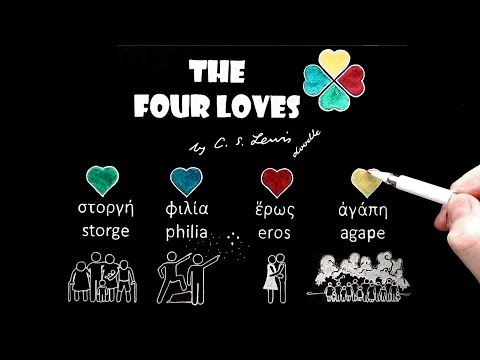In my blog series on C. S. Lewis’s The Four Loves (which I am teaching at my church currently), I first explained how the book came about, developed from radio broadcasts. Then I focused on an ongoing theme in the work, one that comes up in each chapter: how we can deify one of these loves so that it can go wrong—as Lewis says, a love can become a demon if it takes the place of God in our lives.
Another of his main themes that he thought was important to emphasize before turning specifically to the four loves—affection, friendship, eros, and charity—and that I mentioned in the previous post, is the differentiation between gift-loves and need-loves. The former seek to reach out to help others even if we don’t receive anything in return. The latter are cries from our hearts for a certain need to be met.
Lewis then goes on to add another layer to the gift-love and need-love, which he refers to as appreciative love. The difference, he says, is as follows:
In other words, appreciative love simply rejoices in the existence of something. Lewis gives this example:
After saying that, he transitions into a type of appreciative love that can go wrong: the love of nature. Now, Lewis certainly appreciated nature; it was, for him, often a way of connecting to God. Prior to his conversion, when he was always seeking the elusive “joy” that dominated his thinking, he would attempt to capture joy through his nature walks. But as a converted man—a full-fledged Christian—he came to an epiphany about the nature of nature, so to speak.
The mature Lewis writes, “Nature never taught me that there exists a God of glory and of infinite majesty. I had to learn that in other ways. But nature gave the word glory a meaning for me.” It all depends on one’s perspective on life as one experiences nature. After all, nature, while it does include beauty, also includes dangers and devastation. There is a dark side to nature if one is so inclined to see it through a darkened view of life.
But even if one comes to nature with a taste for its beauty and the awe that it can inspire, another danger may arise. One might love it so much that it becomes synonymous with God. Lewis explains it this way:
This love, when it sets up as a religion, is beginning to be a god—therefore to be a demon. And demons never keep their promises. Nature “dies” on those who try to live for a love of nature.
Lewis experienced that disappointment repeatedly in his pre-Christian days as he sought to re-create circumstances that would once again bring him the joy that they had done previously. He eventually came to realize that the joy he had experienced in those rare moments was not what needed to be recaptured. Rather, he finally grasped that all those moments of joy were only pointers to the true goal: the Person and love of God.
Having taken that journey in his own life, he wanted to help others understand the end of the journey as well. Love of nature cannot be equated with love of God. His warning was offered in love.
Before turning to those four loves, Lewis tackled another possible stumbling block for people—an inordinate love of country. That will be the topic for the next post.






